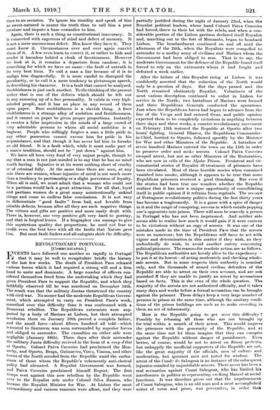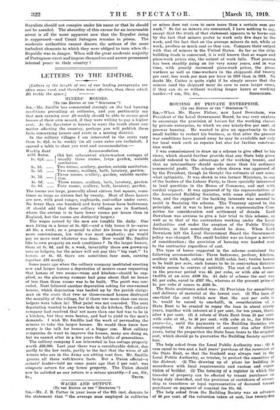REVOLUTIONARY PORTUGAL.
[COMMITNICATED.]
EVENTS have followed one another so rapidly in Portugal _LLI that it may be well to recapitulate briefly the history of the last few weeks. The death of President Paes released various forces which it had required a strong will and a firm hand to unite and dominate. A large number of officers con- sidered themselves freed from the undertaking which they had given President Pees to support the Republic, and which they faithfully observed till he was murdered on December 14th. The result was that the military Juntas threatened the country with civil war. No sooner had the moderate Republican Govern- ment, which attempted to carry on President Pass's work, smoothed over this difficulty than it was confronted with a Democrat rebellion. The Republican extremists were sup- ported by a body of Marines at Lisbon, but their attempted revolution there on January 10th proved a complete failure, and the small force—about fifteen handied all told—which retreated to Santarem was soon surrounded by superior forces and obliged to surrender. The casualties on either side were negligible (January 16th). Three days after their surrender the military Junta difficulty revived in the form of a coup d'ilag at Oporto. Colonel Paiva Couceiro had proclaimed the Mon- archy, and Oporto, Braga, GuimarAes, Vises, Vienna, and other towns of the North seceded from the Republic amid the enthu- alarm of those whom the Republic's vehemently anti-clerical policy had alienated. A Royalist Government was formed, and Paiva Couceiro proclaimed himself Regent. The first troops sent against this new rebellion by the Republic went over to the Royalist side under Colonel Silva Ramos, who became the Royalist Minister for War. At Lisbon the most extraordinary and various rumours were afloat, and they were
partially justified during the night of January 22nd, when the Royalist political leaders, whose hand Colonel Paiva Couceiro had forced, threw in their lot with the rebels, and when a con- siderable portion of the Lisbon garrison declared itself Royalist and, marching out to the fort of Monsanto, began to bombard Lisbon. The bombardment continued on and off until the afternoon of the 24th, when the Royalists were compelled to surrender to a motley army of civilians and Marines whom the Government had been obliged to arm. That is to say, tho moderate Government for the defence of the Republic found itself forced to rely on the extremists whom it had fought and defeated a week earlier.
After the failure of this Royalist rising at Lisbon it was confidently asserted that the reduction of the North would only be a question of days. But the days passed and the North remained obstinately Royalist. Volunteers of rho most various description continued to enlist in Lisbon for service in the North; two battalions of Marines were formed and three Republican Generals conducted the operations. Just when the Republican forces had begun to advance from the line of the Vouga and had entered Over, and public opinion expected them to be completely victorious in anything between three days and three weeks, a counter-revolutionary movement on February 13th restored the Republic at Oporto after two hours' fighting. General Ilbarco, the Republican Commander- in-Chief, hurried to Oporto, followed speedily by the Minister for War and other Ministers of the Republic. A battalion of seven hundred Marines entered the town on the 15th in order to preserve order and make arrests. Colonel Pairs. Couceiro escaped arrest, but not so other Ministers of the Restoration. who are now in cells of the Aljube Prison. Persistent and cir- cumstantial stories of Royalist ill-treatment of prisoners have been circulated. Most of these horrible stories when examined vanished into smoke, although it appears to be true that some Republican prisoners received a good thrashing. But even if the stories had been true one wonders whether the Republic, realizes that it has now a unique opportunity of consolidating itself in public opinion if it refrains from reprisals. The see-saw of Portuguese revolutionary polities during the last thirty years has become a tragicomedy. It is a game with a spice of danger in it and the magic of conspiring, success in which entails popping one's opponents into prison. There will soon be scarcely a person in Portugal who has not been imprisoned. And neither side seems able to realize how much it would gain if it were content to be victorious without an orgy of arrests. It was one of the mistakes made in the time of President Pars that the arrests were so numerous ; but the Republicans will have to act with vigour and determination in this matter if they wish, as they undoubtedly do wish, to avoid another outcry concerning political prisoners. The reasons for resolute action are as follows. The Republican authorities are keenly alive to the expediency-- to put it at its lowest--of acting moderately and checking whole- sale arrests. But in some respects their authority is nominal only, and the thousands of armed civilian defenders of the Republic are able to arrest on their own account, and are nob punished ft they are unable to justify an arrest by accusations based on facts. This is the crux of the whole question. The majority of the arrests are not authorized officially, and it takes many days and weeks before a formal accusation can be brought against the prisoner. These delays keep a very large number of persons in prison at the some time, although the sanitary condi- tions of the prison buildings are such as to make crowding in them an act of inhumanity.
How is the Republic going to get over this difficulty Possibly by releasing all those who are not brought up for trial within a month of their arrest. This would impress the prisoners with the generosity of the Republic, and at the same time not let them imagine that they can conspire against the Republic without danger of punishment. Even better, of course, would be not to arrest on flimsy pretexts. but unhappily the unofficial supporters of the Republic are not, like the great majority of the officials, men of culture and moderation, but ignorant men not noted for wisdom. The arrest of the Conde de Sabugosa is an instance of the subsequent injustice entailed by unjustifiable arrests. There never has been a real accusation against Count Sabugosa, who has limited his interference in polities to representing ex-King Maned at social functions. It was therefore given out that the imprisonment of Count Sabugosa, who is an old man and a most accomplished writer of verse and prose, was preventive, in order that Royalists should not conspire under hie name or that he should not be assailed. The absurdity of this excuse for an inexcusable arrest is all the more apparent now that the Royalist rising is suppreeeed—and Count Sabugosa remains in prison. The moderate authorities cannot disown the actions of the more turbulent elements to which they were obliged to turn when th Republic was in danger. When will the great moderate majority of Portuguese exert and impose themselves and assure permanent internal peace to their country ?







































 Previous page
Previous page